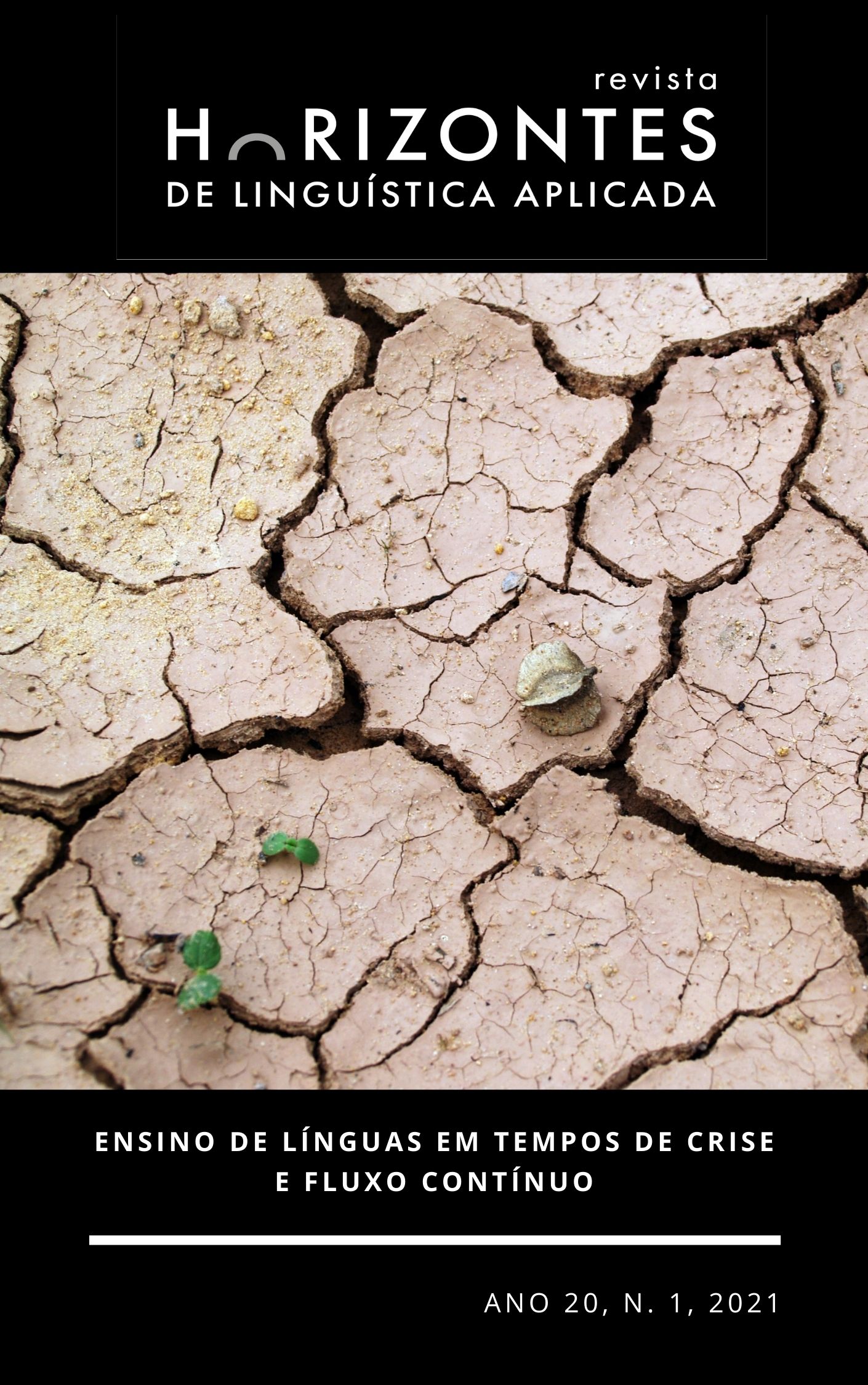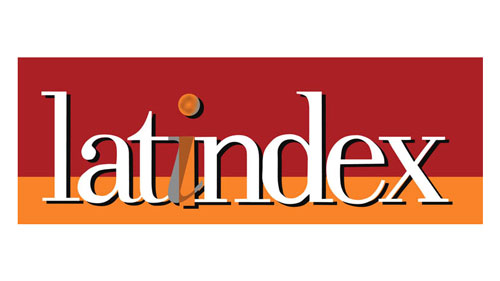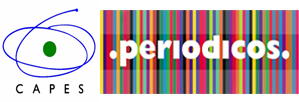Diaries as a methodological tool in English teaching and researching
DOI:
https://doi.org/10.26512/rhla.v20i1.34303Keywords:
Diaries, Methods in Humanities, Interdiciplinarity, Autonomy, MultiliteraciesAbstract
There have been criticisms about the validity of research in Humanities due to the specificities of its study object. Thus discussions on methodological tools are relevant. This investigation was conducted in a public educational institution and focuses on the use of diaries by students. The aim is to explore multiliteracies and develop autonomy in an interdisciplinary approach joining English and Automation subjects. The research questions are: is there evidence that diaries are an effective methodological tool? Which conclusions can be reached based on diary users’ opinions? A questionnaire with open- and closed-ended questions was also administered to the participants. Results show that diaries can be effective since they provide accounts which are not accessible by external observation and they can also help students reflect, understand and organize their learning process.
Downloads
References
AYDIN, S. Factors causing demotivation in EFL teaching process: a case study. The Qualitative Report, v.17, p. 1-13, 2012.
ALLWRIGHT, D.; BAILEY, K. M. Focus on the language classroom: an introduction to classroom research for language teachers. Cambridge: Cambridge University Press, 1991.
ARANHA, M. L. A.; MARTINS, M. H. P. Filosofando: introdução à filosofia. 2. ed. São Paulo: Moderna, 2001.
BAILEY, K. M. The use of diary studies in teacher education programs. In: RICHARDS, J. C.; NUNAN, D. (Eds.). Second language teacher education. Cambridge: CUP, 1990. p. 215-226.
BAILEY, K. M. Competitiveness and anxiety in adult second language learning: looking at an through the diary studies. In: SELIGER, H. W.; LONG, M. H. (Eds.). Classroom oriented research in second language acquisition. Rowley, Mass: Newbury House, 1983. p. 67-103.
BAILEY, K. M. Diary studies of classroom language learning: the doubting game and the believing game. In: SADTONO, E. (Ed.). Language acquisition and the second/foreign language classroom. Singapore: SEAMEO Regional Language Centre (Anthology Series 28), 1991. p. 60-102.
BANERJEE, J. V. Qualitative analysis methods (Section D): reference supplement to the preliminary pilot version of the manual for relating language examinations to the Common European framework of reference for languages: learning, teaching, assessment. Strasbourg: Language Policy Division, Council of Europe, 2004.
BENSON, P. The philosophy and politics of learner autonomy. In P. Benson, P. Voller (Eds.). Autonomy and independence in language learning. London: Longman, 1997. p. 18-34.
BENSON, P. Teaching and researching autonomy in language learning. London: Longman, 2001.
BROCK, M. N. YU, B., WONG, M. ”Journaling” together: collaborative diary-keeping and teacher development. In: J. Flowerdew; M. Brock; S. Hsia (Eds.). Perspectives on second language teacher education. Hong Kong: City Polytechnic of Hong Kong, 1992. p-295-307.
BROWN, J. D. Understanding research in second language learning: a teacher’s guide to statistics and research design. New York: Cambridge University Press, 1988.
BRASIL. Ministério da Educação. Base Nacional Comum Curricular: Ensino Médio. Brasília, 2017.
CARRELL, P.; EISTERHOLD, J. Schema theory and ESL reading. TESOL Quarterly, 17, p. 553-573, 1983.
CARSON, J. G.; LONGHINI, A. Focusing on learning styles and strategies: a diary study in an immersion setting. Language Learning, v. 52, n. 2, p. 401-438, 2002.
CANDLIN, C., General editor’s preface. In: P. Benson; P. Voller (Eds.). Autonomy and independence in language learning. Harlow: Longman, 1997.
CHAO, T. A diary study of university EFL learners' intercultural learning through foreign films. Language, Culture and Curriculum, v. 26, n. 3, p. 247-265, 2013.
CHAUDRON, C. The interaction of quantitative and qualitative approaches to research: a view of the second language classroom. TESOL Quarterly, v. 20, p. 709-717, 1988.
CHAUÍ, M. Convite à filosofia. 12. ed. São Paulo: Ática, 2002.
COPE, B.; KALANTZIS, M. “Multiliteracies”: new literacies, new learning. Pedagogies: An International Journal, v. 4, p. 164-195, 2009.
DENZIN, N.; LINCOLN, Y. O planejamento da pesquisa qualitativa: teorias e práticas. Tradução de Sandra Regina. Netz. Porto Alegre: Armed, 2006.
DUKE, J. Joining the dots: piloting the work diary as a data collection tool. Issues in Educational Research, v. 22, n. 2, p. 111-126, 2012.
ELLIOT, M.; WILSON, J. Content validity. In: GERANPAYEH, A.; TAYLOR, L. (Ed.). Examining listening: research and practice in assessing second language listening. Cambridge: Cambridge University Press, 2013. p. 152-24.
FAZENDA, I. C. A. Interdisciplinaridade: um projeto em parceria. Coleção Educar. v. 13. São Paulo: Loyola, 1991.
FAZENDA, I. C. A. Interdisciplinaridade: história, teoria e pesquisa. Campinas: Papirus, 1994.
FLICK, U. An introduction to qualitative research: theory, method and applications. 5 ed. London: Sage, 2014.
GIL, A. C. Métodos e técnicas de pesquisa social. 5. ed. São Paulo: Atlas, 1999.
GROTJAHN, R. On the methodological basis of introspective methods. In: FAERCH, C.; KASPER, F. (Ed.). Introspection in second language research. Clevedon Avon, England: Multilingual Matters, 1987.
HANSEN-THOMAS, H. A case study of reflective journals in a university level writing course in Hungary. English Teaching Forum, v. 41, n. 1, p-22-28, 2003.
HOLEC, H. Autonomy and foreign language learning. Oxford/New York: Pergamon Press, 1981.
HOLMES, V. L.; MOULTON, M. R. A contrarian view of dialogue journals: the case of a reluctant participant. Journal of Second Language Writing, v. 4, n. 3, p. 223-251, 1995.
JOHNSON, K.; JOHNSON, H. (Ed.). Encyclopaedic dictionary of applied linguistics: a handbook for language teaching. Oxford: Blackwell Publishers, 1998.
KOBAYASHI, E., ZAMPINI, E. Multiletramentos e autonomia: um estudo de caso no ensino de língua inglesa. Revista do GEL, v. 17, n. 1, p. 138-159, 2020.
LEE, E. The significance of building and activating background knowledge in the teaching of Shakespeare in the ESL classroom. Polyglossia, v. 15, 2008. Disponível em: https://www.apu.ac.jp/rcaps/uploads/fckeditor/publications/polyglossia/Polyglossia_V15_Lee.pdf. Acesso em: 10 set. 2020.
LEFFA, V. J. Quando menos é mais: a autonomia na aprendizagem de línguas. In: NICOLAIDES, C.; MOZZILLO, I.; PACHALSKI, L.; MACHADO, M.; FERNANDES, V. (Orgs.). O desenvolvimento da autonomia no ambiente de aprendizagem de línguas estrangeiras. Pelotas: UFPEL, 2003. p. 33-49.
MACKEY, A. Input, interaction and second language development: an empirical study of question formation in ESL. Studies in Second Language Acquisition, v. 21, n. 4, p. 557-587, 1999. Disponível em: http://dx.doi.org/10.1017/S0272263199004027
MAHMOUDI, S. Investigating the effect of cultural schemata activation on EFL learners’ listening comprehension. English Language, Literature, Culture, v. 2, p. 99-104, 2017.
MATSUMOTO, K. Diary studies of second language acquisition: a critical overview. JALT Journal, v. 9, n. 1, p. 17-34, 1987.
MOCHIZUKI, N.; ORTEGA, L. Balancing communication and grammar in beginning-level foreign language classrooms: a study of guided planning and relativization. Language Teaching Research, v. 12, n. 1, p. 11-37, 2008. Disponível em: http://dx.doi.org/10.1177/1362168807084492
NUNAN, D. Research methods in language learning. Cambridge: Cambridge University Press, 2005.
OLIVEIRA, P. S. Caminho de construção da pesquisa em ciências humanas, 1998. Disponível em: https://repositorio.usp.br/item/001003899. Acesso em: 17 set. 2020.
OPPENHEIM, A. N. Questionnaire design, interviewing and attitude measurement. London: Cassell, 1992.
OXFORD, R. L. Language learning strategies: what every teacher should know. New York: Newbury House, 1990.
PAIVA, V. L. M. O. Autonomia e complexidade. Linguagem & Ensino, v. 9, n. 1, p. 77-127, 2006.
PALMER, C.; PALMER, G. Diary Keeping and Reflecting on Practice. In: PECK, A.; WESTGATE, D. (Eds.). Language Teaching in the Mirror. London: Centre for Information on Language Teaching and Research (CILT), 1994. p. 30-36.
PARKINSON, B.; HOWELL-RICHARDSON, C. Learner diaries. In: BRUMFIT, C. J.; MITCHELL, R. (Eds.). Research in the language classroom, ELT Documents 133, London: Modern English Publications/British Council, p. 128-400, 1990.
PORTER, P. A.; GOLDSTEIN, L. M.; LEATHERMAN, J.; CONRAD, S. An ongoing dialogue: learning logs for teachers. In: RICHARDS, J. C.; NUNAN, D. (Eds.). Second language teacher education. Cambridge, UK: Cambridge University Press, 1990. p. 227-240.
RICHARDS, J. C.; LOCKART, C. Reflective teaching in second language classroom. Cambridge: Cambridge University Press, 1994.
ROJO, R. Entre plataformas, ODAS e protótipos: novos multiletramentos em tempos de web. The Especialist: Descrição, ensino e aprendizagem, v. 38, n. 1, p. 1-19, 2017.
SAKUI, K. Wearing two pairs of shoes: language teaching in Japan. ELT Journal, v. 58, n. 2, p. 155-163, 2004. Disponível em: http://dx.doi.org/10.1093/elt/58.2.155
SCHMIDT, R. W.; FROTA, S. N. Developing basic conversational ability in a second language: a case study of an adult learner of portuguese. In: DAY, R. R. (Ed.). Talking to learn: conversation in second language acquisition. Rowley: Newbury House, 1986. p. 237-326.
SIEGEL, J. Advice in listening instruction: degrees of transferability. International Journal of Innovation in English Language Teaching and Research, v. 3, n. 2, p. 1-18, 2013.
SKEHAN, P. Task-based instruction. In: GRABE, W. (Ed.). Annual Review of Applied Linguistics. New York: Cambridge University Press, 1998. p. 268-286.
SOMMERMAN, A. Inter ou transdisciplinaridade: da fragmentação disciplinar ao novo diálogo entre saberes. São Paulo: Paulus, 2006.
SYMON, G. Qualitative Research Diaries. In: SYMON G.; CASSELL, C. (Eds.). Qualitative methods and analysis in organizational research: a practical guide. London: Sage Publications Inc., 1998. p. 94-117.
TUDOR, I. Learner-centredness as language education. Cambridge: Cambridge University Press, 1997.
VAN LIER, L. Ethnographty: bandaid, bandwagon or contraband. In: BRUMFIT, C.; MITCHELL, R. (Eds.). Research in the language classroom. London: Modern English Publications, 1990.
VAN LIER, L. The classroom and the language learner. London: Longman, 1989.
YASTIBAS, G.; YASTIBAS, A. The effect of peer feedback on writing anxiety in Turkish EFL (English as a Foreign Language) students. Procedia: Social and Behavioral Sciences, v. 199, p. 530-538, 2015.
WARSCHAUER, M. A developmental perspective on technology in language education. TESOL Quarterly, v. 36, n. 3, p. 453-475, 2002.
WENDEN, A. Learner strategies for learner autonomy. Englewood Cliffs: Prentice Hall, 1991.
Downloads
Published
How to Cite
Issue
Section
License
Copyright (c) 2021 Revista Horizontes de Linguistica Aplicada

This work is licensed under a Creative Commons Attribution-NonCommercial-NoDerivatives 4.0 International License.

A Revista Horizontes de Linguística Aplicada de http://seer.bce.unb.br/index.php/horizontesla/index é licenciado sob uma Licença Creative Commons Atribuição-Uso não-comercial-Vedada a criação de obras derivadas 3.0 Unported.
- Autores mantém os direitos autorais e concedem à revista o direito de primeira publicação, sendo o trabalho simultaneamente licenciado sob a Creative Commons Attribution License o que permite o compartilhamento do trabalho com reconhecimento da autoria do trabalho e publicação inicial nesta revista.
- Autores têm autorização para assumir contratos adicionais separadamente, para distribuição não-exclusiva da versão do trabalho publicada nesta revista (ex.: publicar em repositório institucional ou como capítulo de livro), com reconhecimento de autoria e publicação inicial nesta revista.





